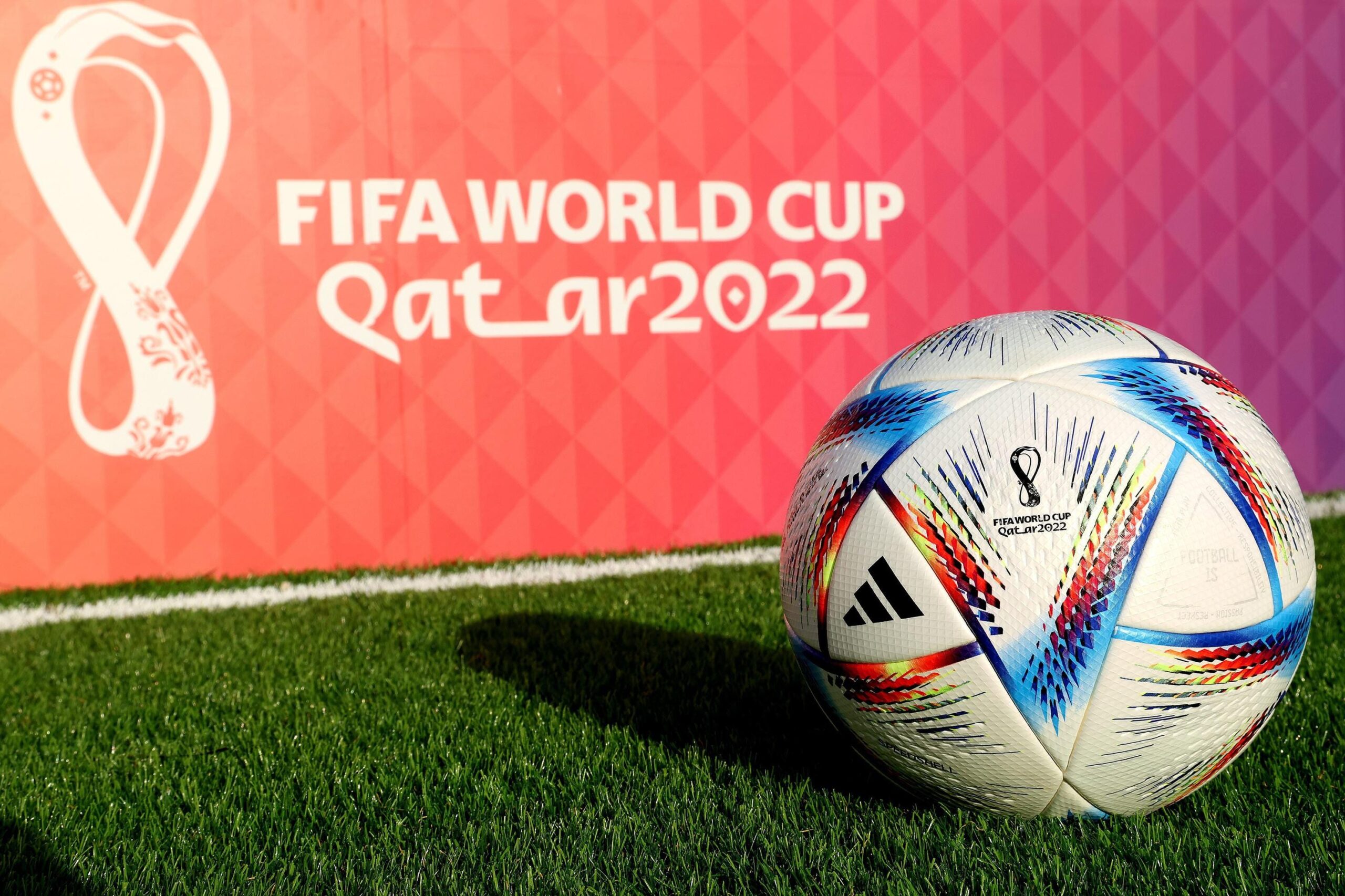
DOHA, QATAR – MARCH 30: al-Rihla, the official adidas matchball for the FIFA World Cup Qatar 2022 is … [+]
FIFA via Getty Images
The long-anticipated FIFA Qatar 2022 World Cup kicks off later today with the hosts facing off against Ecuador in the tournament’s curtain raiser.
A winter “World Cup like no other,” right from its inception in 2010, the tournament was embroiled in allegations of corruption on the part of the FIFA executive committee who stunned the world when they awarded the most prestigious global sporting event on the planet to the tiny desert state.
In recent years, Qatar’s hosting of the tournament has continued to court controversy in relation to its impact on minority groups.
These have touched every segment of the diversity spectrum, from the deaths of some 6,500 migrant workers drafted in from the Indian subcontinent to build the tournament’s eight stadiums on hazardous deadlines, to the spotlight being shone on Qatar’s record for gender inequality.
Last year, Human Rights Watch criticized the Qatari authorities for its discriminatory male guardianship system in which women in the country are denied the right to make many key decisions affecting their lives, such as on matters related to reproductive health, who they can marry, where they may study, whether they can travel abroad and a diminished legal status as the main guardian of their children.
As recently as October, the Qatari ambassador to the U.K. Fahad bin Mohammed Al-Attiyah warned LGBTQ soccer fans visiting the tournament against “public displays of affection” if they were part of a couple as they could face arrest in the strictly Muslim Gulf state.
Biting Back
MORE FOR YOU
In a jaw-dropping 90-minute monologue delivered yesterday on the eve of the tournament, FIFA President Gianni Infantino leaped to the defense of Qatar, accusing the west of “hypocrisy.”
Infantino opened with the statement: “Today I feel Qatari, I feel Arab, I feel African, I feel gay, I feel disabled, I feel a migrant worker.”
Later, he continued, “We have been taught many lessons from Europeans and the Western world. I am European. For what we have been doing for 3,000 years around the world, we should be apologizing for the next 3,000 years before giving moral lessons.”
The FIFA President’s statements received criticism from multiple quarters for appearing “tone-deaf.”
Natalie Sawyer, a presenter on talkSPORT, the largest independent sports radio station in the U.K. said of Infantino’s comments related to disability on the broadcaster’s Weekend Sports Breakfast show aired live from Doha:
“For him to say, ‘I feel disabled’, how offensive is that to disabled people? Disabled people will see that and be like, ‘No you don’t – how dare you?’.”
Most accessible World Cup ever
Though Infantino’s oratorical embellishment is eccentric at best, if not clumsy and misguided, when it comes to disability inclusion at least, he may indeed be able to live up to his earlier promise of making Qatar 2022 “the most accessible World Cup ever.”
The rights of persons with disabilities, unlike those of other minority groups that are not protected in Qatar, are enshrined in Qatari law.
For disabled soccer fans, the tournament should offer a rich bounty of accessibility provisions, from audio-described commentary of games in both Arabic and English to all of the eight tournament stadiums offering ample disabled parking, seating and concession stands.
Wheelchair users will be able to view the action, not just from an isolated low- level disabled seating area but from multiple vantage points located at different heights throughout the stadia.
Three of the stadiums feature “sensory rooms” for neurodiverse spectators, particularly younger children on the autism spectrum, who may find the large crowds and raucous atmosphere overwhelming at times.
Overall, Qatar 2022 will see the largest deployment of sensory rooms in sporting history.
In many ways, and in an affirmation of what Infantino had to say about the west getting its own house in order, the accessibility provisions at the Qatar 2022 World Cup puts certain European countries to shame.
In England, home of the lucrative Premier League, according to recent data published by sports accessibility charity Level Playing Field, the number of fans citing a lack of basic accessibility as a reason for not attending live sporting events has risen from 30.5% to 36.5% over the past 12 months.
Of perhaps even greater concern is the number of survey respondents stating that negative “attitudes of others” was a barrier to attending live sports events – up from 15% in 2021 to 28.5% in 2022.
World Cup tournament organizers in Qatar have also endeavored to ensure that disability access stretches beyond just the stadia and extends to accommodation and fan parks too.
At the same time, widespread accessibility upgrades to the country’s public transport infrastructure will ensure that the tournament’s disability inclusion legacy lasts for decades to come.
Speaking at a forum last month to showcase the work undertaken around disability access during the tournament and beyond, Faisal al-Kohaji, Accessibility Forum member and chairperson of the Qatar Social Cultural Club for the Blind said:
“What we have seen in the area of accessibility since Qatar won the right to host the World Cup has been life-changing for the disabled community. We now have a modern transportation network that is equipped for all different needs, as well as greater accessibility in museums, shopping destinations and public spaces.”
Dr. Victor Pineda, a California-based world-renowned disability rights activist and academic, who recently partnered with Doha Debates through his organization World Enabled to produce Disability Justice – a series exploring the varying perspectives of disabled people from different countries around the world – is inclined to agree.
“I’m super curious to see what the most accessible World Cup tournament in history looks and feels like. I know the Qatar Foundation did a lot of outreach to the disability community and brought some of the best practices to bear,” says Pineda.
“I think that any global event provides an opportunity for people to come together, and the World Cup is no different. The question is, what do we do when we’re together? Do we create systems and places that allow us to celebrate our difference? Do we allow ourselves to learn from each other? Do we allow ourselves to create a legacy that supports the best practices?”
Speaking of best-practice, the work Qatar has undertaken around disability inclusion in recent years serves as a shining example of timeless accessibility principles at work – codesigning alongside participants with disabilities and baking in accessibility planning and goals from the start of a project.
Yet, a word of caution is surely required.
Addressing the international, intersectional nature of the U.N. Convention on the Rights of Persons with Disabilities which Pineda himself helped to draft between 2002 and 2007 – he explains:
“People with and without disabilities are human beings with the same inalienable rights and the desire to live with justice, peace, dignity and fundamental freedoms. Every part of disability rights is universal because it is a universal convention on human rights, human beings living with disabilities. So, it’s not a pick-and-choose type of menu.”
When the final whistle blows on the 2022 World Cup Final on December 18, the winner is crowned and, during the following days, the streets of Doha run a little calmer – those with the responsibility of carrying forward the tournament’s legacy might justifiably ask themselves whether, in fact, picking and choosing some minority segments over others is fully aligned with the true principles of diversity, equity and inclusion.








